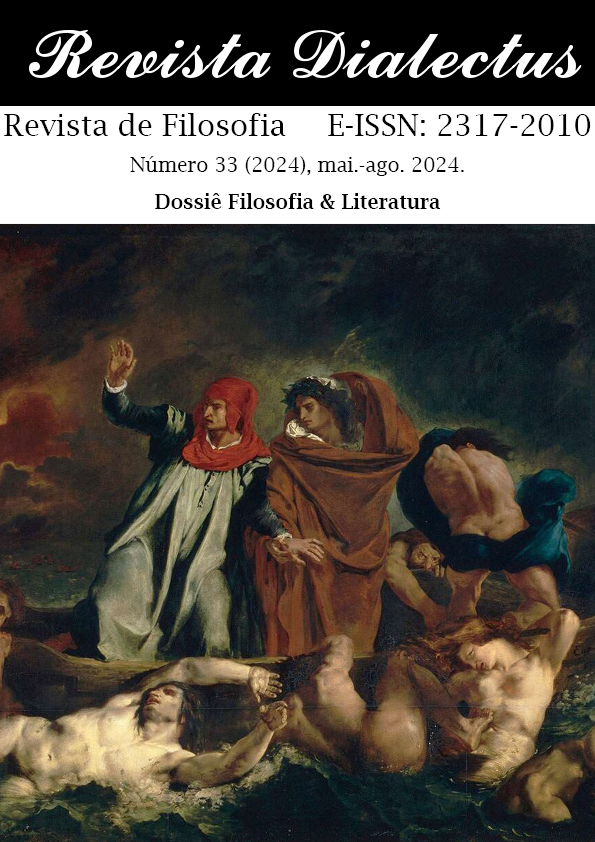QUESTIONING THE SKULL: ZHUANGZI AND HAMLET ON DEATH
DOI:
https://doi.org/10.30611/33n33id94054Keywords:
Zhuangzi, Hamlet, Death, Comparative PhilosophyAbstract
This article aims to explore some aspects of our shared human experience of death through a parallel reading of Hamlet and Zhuangzi. These two classics belong to radically different cultural contexts, and both have traditionally been interpreted as texts in between philosophy and literature. As such, I hope this article will be of some interest for both students of world literature and transcultural philosophy, disciplines that, despite the contemporary academic distinctions, share much in common. Section 1 highlights some differences and similarities between Hamlet and Zhuangzi. Section 2 proceeds by elucidating three aspects of the problem of death approached by both texts (uncertainty; the death of others; my death). Section 3 examines two predominant perspectives in Chinese and European cultural backgrounds (the “individual” and the “cosmic” perspectives). Sections 4 analyzes how Hamlet approaches uncertainty, the death of others and my death from the individual perspective, while section 5 does the same for the cosmic perspective in Zhuangzi. In section 6, the two mirroring passages of the dialogues with the skull are compared, showing how the individual and the cosmic perspectives mutually implicate each other as two sides of the same coin.
Downloads
References
ARIÈS, Philippe. The Hour of Our Death. Translated by Helen Weaver. New York: Alfred A. Knopf, 1981.
BIAN, Zhilin 卞之琳 (tr.). Hamlet 哈姆雷特. Hangzhou: Zhejiang Literature and Art Publishing House 浙江文艺出版社. First published in 1956, Beijing: People’s Literature Publishing House 人民文学出版社, 2001.
CHAI, David.. On pillowing one’s skull: Zhuangzi and Heidegger on death. In: Frontiers of Philosophy in China 11.3, 2016, p. 483-500.
CSIKSZENTMIHALYI, Mark. Allotment and Death in Early China. In Mortality in Traditional Chinese Thought. ed. Amy Olberding and Philip J. Ivanhoe. Albany: State University of New York Press, 2011, p. 177-190.
ERKES, Eduard. The God of Death in Ancient China. In: T'oung Pao 35.Livr.1/3, 1939, p. 185-210.
FANG PING 方平 (tr.). The Complete Works of Shakespeare. Vol. 4. 莎士比亚全集 第四卷. Shanghai: Shanghai Translation Publishing House 上海译文出版社. First published in 2000, Wuhan: Hubei Education Press 湖北教育出版社,2014.
GARBOLI, Cesare (tr.) Amleto. Torino: Giulio Einaudi Editore, 2009..
GUO QINGFAN 郭慶藩 (ed.). Zhuangzi with Collected Commentaries 莊子集釋. Revised and corrected by Wang Xiaoyu 王孝魚, in four volumes. Beijing: Zhonghua Book Company 中華書局, 1961.
HALADYN, Julian J. Friedrich’s Wanderer: Paradox of the Modern Subject. RACAR : Revue d'art canadienne / Canadian Art Review 41 (1), 2016, p. 47-61.
HARPER, Elizabeth. The Early Modern European (non) Reception of the Zhuangzi text. The Journal of East West Thought 9.4, 2019, p. 23-37.
HUANG, Yong 黃勇. The Ethics of Difference in the Zhuangzi. Journal of the American Academy of Religion 78.1, 2010, p. 65-99.
JOHNSTON, Mark. Surviving Death. Princeton, NJ: Princeton University Press, 2010.
JOUGHIN, John J. Philosophical Shakespeares. London: Routledge, 2000.
LIANG, Shiqiu 梁实秋 (tr.). The Tragedy of Hamlet 哈姆雷特. Beijing: China Radio and Television Publishing House 中国广播电视出版社, Shanghai: The Commercial Press 商务印书馆, 2001.
LIU, Jianmei 劉劍梅. Zhuangzi and Modern Chinese Literature. New York: Oxford University Press, 2016.
LYNN, Richard J. (tr.). A New Translation of the Sayings of Master Zhuang as Interpreted by Guo Xiang. New York: Columbia University Press, 2022.
MAIR, Victor H. Wandering on the Way: Early Taoist Tales and Parables of Chuang Tzu. New York: Bantam, 1994.
NEILL, Michael. Issues of Death: Mortality and Identity in English Renaissance Tragedy. New York: Oxford University Press, 1997.
PENG, Kaiping 彭凯平; NISBETT, Richard E. Culture, Dialectics, and Reasoning About Contradiction. American Psychologist 54.9, 1999, p. 741–754.
ROŠKER, Jana S. Interpreting Chinese Philosophy: A New Methodology. London: Bloomsbury, 2021.
SHAO, Ting 邵挺 (tr.). Hamlet 天仇记. Part of the first series of The Complete Library 萬有文庫, edited by Wang Yunwu 王雲五. Shanghai: The Commercial Press 商务印书馆, 1930.
SHAKESPEARE, William. Hamlet, The Arden Shakespeare Third series, edited by Ann Thompson and Neil Taylor. London: Bloomsbury Publishing, 2006.
SLINGERLAND, Edward. “Conceptions of the Self in the Zhuangzi: Conceptual metaphor analysis and comparative thought.” Philosophy East and West (2004), 2004, p. 322-342.
STEWART, Stanley. Shakespeare and Philosophy. New York and London: Routledge, 2010.
TIAN, Han 田汉 (tr.). Shakespeare Masterpieces. Part 1. Hamlet 莎翁杰作第一种《哈孟雷特》. Young China Society series 少年中国学会丛书. Shanghai: Zhonghua Book Company 中華書局, 1922.
WALEY, Arthur. Three Ways of Thought in Ancient China. London: Allen & Unwin, 1939.
WATSON, Robert N. The Rest is Silence. Death as Annihilation in the English Renaissance. Berkeley/Los Angeles/London: University of California Press, 1994.
XU, Keqian 徐克謙. A Different Type of Individualism in Zhuangzi. Dao 10, 2011, p. 445-462.
ZHU, Shenghao 朱生豪 (tr.). Hamlet 哈姆雷特. Wuhan: Hubei Education Press 湖北教育出版社. First published in 1947, Shanghai: World Book Co. 世界书局, 1997.
ZIPORYN, Brook. Zhuangzi: The Complete Writings. Indianapolis: Hackett Publishing, 2020.
ZIPORYN, Brook (tr.). Zhuangzi: The Essential Writings with Selections from Traditional Commentaries. Indianapolis: Hackett, 2009.
ZIPORYN, Brook. The Self-so and its Traces in the Thought of Guo Xiang. Philosophy East and West 43.3, 1993, p. 511-539.
Downloads
Published
Issue
Section
License
Copyright (c) 2024 Riccardo Peruzzi

This work is licensed under a Creative Commons Attribution-NonCommercial-NoDerivatives 4.0 International License.
Authors who publish in this journal agree to the following terms:
- Authors retain the copyright and grant the journal the right of first publication, with the work simultaneously licensed under the Attribution-NonCommercial-NoDerivatives 4.0 International (CC BY-NC-ND 4.0) License, which allows the non-commercial sharing of work, without modifications and with acknowledgment of authorship and initial publication in this journal.
- Authors are authorized to take additional contracts separately, for non-exclusive distribution of the version of the work published in this journal (eg publish in institutional repository or as a book chapter), with acknowledgment of authorship and initial publication in this journal.
- Authors are allowed and encouraged to publish and distribute their work online (eg in institutional repositories or on their personal page) at any point before or during the editorial process, as this can generate productive changes as well as increase the impact and citation of published work (See The Free Access Effect).



















